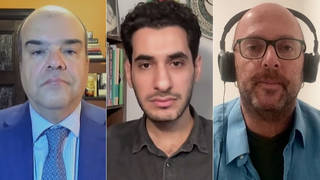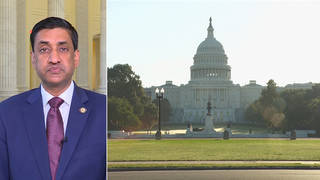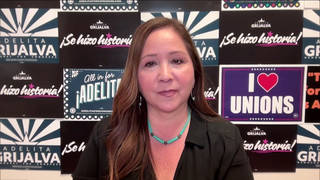
Guests
- Lynn Povichbegan her career at Newsweek as a secretary. In 1975, she became the first woman senior editor in the magazine’s history. Since leaving Newsweek in 1991, she has been editor-in-chief of Working Woman magazine and managing editor/senior executive producer for MSNBC.com. In 2013 she received the Lifetime Achievement Award from the Washington Press Club Foundation, which was founded in 1919 to ensure that women established an equal place in the newsroom. Povich is the author of The Good Girls Revolt: How the Women of Newsweek Sued Their Bosses and Changed the Workplace.
We look at the firing of Jill Abramson, the first female executive editor of The New York Times in its 160-year history, who had reportedly complained about earning less pay than her male predecessors. This apparently amplified unattributed characterizations that Abramson’s management style was “brusque” and “pushy,” which critics took issue with since similar behavior from men in similar roles is often accepted, and even encouraged. “Jill put many, many women in top positions and was a role model for the younger women and all women at The New York Times,” says our guest Lynn Povich, who was the first female senior editor in Newsweek’s history. “We know how upset they are to see the way in which she was dismissed.” Povich also discusses the status of women in the media, which she helped shape when she led a lawsuit in 1970 against Newsweek for hiring women only as researchers, and rarely promoting them to reporter or editor. Following a victory in the case, women working at Time, Reader’s Digest, The New York Times, NBC and the Associated Press also sued their employers. Povich recounts the story in her book, “The Good Girls Revolt: How the Women of Newsweek Sued Their Bosses and Changed the Workplace.” Since leaving Newsweek in 1991, she has been editor-in-chief of Working Woman magazine and managing editor/senior executive producer for MSNBC.com.
Transcript
JUAN GONZÁLEZ: We turn now to The New York Times's dismissal of its top editor, who was the first woman to hold that position in the newspaper's 160-year history. Executive Editor Jill Abramson was replaced Wednesday in a surprise move by publisher Arthur Sulzberger Jr., just two-and-a-half years after her appointment. During her tenure, the Times won eight Pulitzer Prizes. She has been replaced by Managing Editor Dean Baquet, who became the first African American to take up the post. Both Abramson and the Times have signed non-disparagement agreements, and Sulzberger has insisted her firing was due to, quote, “an issue with management in the newsroom.” Abramson reportedly had complained about earning less pay than her male predecessor, Bill Keller.
AMY GOODMAN: The New York Times denied the charge, saying Abramson’s total compensation package in 2013 was comparable to that of earlier executive editors. But Ken Auletta of The New Yorker magazine writes, quote, “As executive editor, Abramson’s starting salary in 2011 was $475,000, compared to Keller’s salary that year, $559,000. Her salary was raised to $503,000, and—only after she protested—was raised again to $525,000. She learned that her salary as managing editor, $398,000, was less than that of the male managing editor for news operations, John Geddes. She also learned that her salary as Washington bureau chief, from 2000 to 2003, was a hundred thousand dollars less than that of her successor in that position, Phil Taubman.”
JUAN GONZÁLEZ: The developments drew attention to the pay discrimination women are still widely recognized to face. Senate Majority Leader Harry Reid cited them Thursday when he renewed his call to pass the Paycheck Fairness Act, which Republicans blocked a vote on for the third time last month. The bill would prohibit retaliation against employees who share their salary information with each other.
SEN. HARRY REID: Madam President, this is an issue that is more than just something that takes place away from the madding crowds. Look what happened, it appears, in The New York Times. The woman that ran that newspaper was fired yesterday. Why? It’s now in the press, because she complained she was doing the same work as men in two different jobs and made a lot less money than they did. That’s why we needed that legislation.
AMY GOODMAN: Well, to discuss the dismissal of The New York Times Executive Editor Jill Abramson and the status of women in the media, we’re joined by Lynn Povich. Povich began her career at Newsweek as a secretary, and in 1975 she became the magazine’s first woman senior editor. This came after she joined more than 40 other women staffers in suing Newsweek for hiring women only as researchers and rarely promoting them to reporter or writer. The landmark lawsuit was filed on the same day the magazine ran a cover story on the women’s movement, with the headline “Women in Revolt.” Following the case, women working at Time, the Reader’s Digest, The New York Times, NBC and the Associated Press also sued their employers.
AMY GOODMAN: Lynn Povich recounts the story in her book, The Good Girls Revolt: How the Women of Newsweek Sued their Bosses and Changed the Workplace. Since leaving Newsweek in 1991, she’s been editor-in-chief of Working Woman magazine and managing editor, senior executive producer for MSNBC.com. In 2013, she received the Lifetime Achievement Award from the Washington Press Club Foundation, which was founded in 1919 to ensure that women established an equal place in the newsroom.
Lynn Povich, we welcome you to Democracy Now! A fascinating story, your own, but let’s first talk about what happened to Jill Abramson and your assessment of what has taken place.
LYNN POVICH: Well, first of all, Jill was a towering figure, and has been for a long time, in the journalism business. She is an excellent reporter. She’s done tough stories. She’s a fabulous investigative reporter. She ran a great Washington bureau of The New York Times. And, of course, for those of us in the media, her appointment was significant. That a woman would be able to be the editor of The New York Times was extraordinary. And so, this is really a sad and very upsetting ending to her reign.
You know, I think the problems with Jill, as we’ve learned now from the New Yorker piece, is that she has been consistently underpaid in the previous positions that she had, as well. It’s not clear what the total compensation issue was with Jill, so we’re not exactly sure how that did compare, but I think it shows how upset she was that, at least according to Ken Auletta’s piece, she actually brought in a lawyer to talk about her salary and her compensation. And I think what resonates is that women are consistently underpaid in every single field. We know that well. And we know that even at the top. When Mary Barra became CEO of GM, she also was underpaid.
JUAN GONZÁLEZ: And in terms of her impact in the short period that she has—she was the executive editor, could you talk about what happened under her regime there?
LYNN POVICH: Well, she seemed to have, from the outside, enormous success. I mean, she had—she won eight Pulitzers in the course of her reign. There were some issues where she appointed some people who didn’t work out. Fine. There were certainly talks about her personality. There’s often—often people say about women, you know, they’re judged on their personality, and men are judged on the outcomes. That’s also been consistently true when you talk about women, especially in top management. You know, I think it’s also a question of managing up. Some people can be difficult, but they manage up well. Other people may have more difficult relationships with their bosses.
AMY GOODMAN: I want to go to Jill Abramson’s legacy at The New York Times. First, this is a clip of Jill Abramson speaking to CBS News just a few weeks after she was appointed executive editor in 2012.
JILL ABRAMSON: It would be nice to think we would get to the point where it wasn’t so remarkable when a woman rose to the top job at an important institution. But I think, you know, we aren’t there yet.
AMY GOODMAN: As of this Wednesday, The New York Times masthead no longer lists Jill Abramson as executive editor, but it does list many of the women she appointed during her tenure. In 2013 alone, she made Carolyn Ryan the Washington bureau chief, Alison Mitchell the national editor. She also made Pamela Paul head of the Sunday Book Review. In addition, Abramson created a race and ethnicity beat at the paper, covered by national correspondent Tanzina Vega. And she appointed Margaret Sullivan as public editor, the first woman to hold the position at the paper. It’s also worth noting that The New York Times opinion page, which is outside the executive editor’s purview, has a 10-to-two ratio of male-to-female columnists. Lynn Povich?
LYNN POVICH: Well, it is true, and we know this, that when women run something, they tend to appoint other women. And certainly Jill did that, with bringing so many women into the management positions. I just want to say that actually the appointment of Margaret Sullivan is the publisher’s appointment; it is not the editor’s appointment. So, Arthur Sulzberger was responsible for Margaret Sullivan’s appointment. But Jill put many, many women in top positions and was a role model for the younger women and all women at The New York Times. And I think we know how upset they are to see the way in which she was dismissed.
JUAN GONZÁLEZ: Can you look back in terms of your struggles within the industry, when women begin to raise these issues in the newsroom with management, the reaction, the—what happens to those who speak out?
LYNN POVICH: Well, you know, there are those people who have supported women. There are always allies among the men. And then it’s also true that many men in management feel that women aren’t as qualified, they’re getting ahead because of affirmative action. They’re against that. And that does create tension among your colleagues. And so, therefore, women are always scrutinized in their management abilities, you know, how they manage, because so much stigma is attached to being more assertive, being aggressive, being what is called pushy. And women, unfortunately, have to learn how to navigate those waters well, and men don’t.
AMY GOODMAN: Interesting you should mention pushy, because although they have a non-disparagement agreement, I guess, Jill Abramson and the Times, her daughter, Jill Abramson’s daughter, tweeted out a picture of her mother, and it’s a picture of Jill Abramson boxing. And under it, it says “pushy.” Well, I want to turn to Jill Abramson speaking at Columbia University in January on a panel about journalism after Edward Snowden. She noted, during the Obama administration, there’s been seven criminal leak investigations, more than twice the number of any previous administration.
JILL ABRAMSON: This seems to be, if not a stated policy, a reality, where journalism about sensitive national security issues, that I see as vitally in the public interest, is effectively being criminalized, and a real freeze is setting in in what had been, to this point, I think, a healthy discourse between sources and journalists. And I might here cite, if I can take just a minute, because the gentleman had quite a long bit of time to speak, is to point out that Max Frankel, in a very famous affidavit in the Pentagon Papers case, wrote eloquently about how the public does benefit from this discourse. And I have seen, both in the job as Washington bureau chief of the Times, certainly then growing as managing editor and now as executive editor, that these criminal leak investigations have had a very profound effect on journalism.
AMY GOODMAN: That was Jill Abramson speaking in January, when she was still executive editor of The New York Times. Sitting next to her was Janine Gibson, editor-in-chief of Guardian US. The New York Times has reported Abramson had made a job offer to Gibson to be a co-managing editor position at The New York Times with Dean Baquet, but apparently Janine Gibson turned that down. The significance of her battle in the context of what you’ve gone through, Lynn Povich? We don’t have much time, but yours is a fascinating history, what happened at Newsweek and the struggles you see with women. Briefly encapsulate that for us.
LYNN POVICH: Well, we—as was said, we were not even allowed to be promoted out of a category. And so, we did have to file a legal complaint with the Equal Employment Opportunities Commission.
AMY GOODMAN: There were no women reporters at Newsweek?
LYNN POVICH: There were a few women who had gotten out of the category as reporters. I had actually been promoted as a junior writer, the only woman writing at the time. And so, our lawsuit, our legal complaint, was about how we were treated and discriminated against as women, since men with equal credentials coming out of the same kinds of colleges were immediately hired as reporters and writers. We actually had—our lawyer was Eleanor Holmes Norton. We actually had to file a second time. And our second lawyer, Harriet Rabb, was actually hired by The New York Times women when they filed their suit in 1974. We didn’t actually ask for money. We should have, but we were—just wanted to get out of the category.
And it’s unusual that I, as one of the ringleaders of the suit, benefited by becoming the first woman senior editor. Most women on the front lines of these lawsuits did not benefit. Betsy Wade, the lead plaintiff of The New York Times, who was on the foreign desk, ended up becoming a travel writer. And she said to me, “Lynn, we did a brave thing, but we knew it would be for the next generation.” Now, enormous progress has been made for women in journalism. We see them covering wars now, when they weren’t allowed to. We see them covering the president, when they were only covering the first lady. And we see breakthroughs, like Jill Abramson. The head of NBC News is a woman. I mean, we’ve begun to see a few cracked ceilings at the top, but certainly not enough.
JUAN GONZÁLEZ: And you certainly didn’t expect that, two generations later, you’d still be dealing with the issue of equal pay for equal work.
LYNN POVICH: Exactly, and everywhere equal pay for equal work. That is why, you know, in Congress, this law has been languishing there, and the president has certainly tried to do something, as much as he can, with executive orders.
AMY GOODMAN: And what happened after your lawsuit at Newsweek? Now, talk about the day that your lawsuit came out. I mean, that’s pretty astounding.
LYNN POVICH: We had been organizing to file a complaint. And when we heard that Newsweek was going to do a cover story on the women’s movement, and because there were no experienced women writers at Newsweek at the time, they went outside the magazine for the first time in 37-year history and hired a wonderful writer at the New York Post, Helen Dudar, to come and freelance the piece. And we thought, “Aha!”
AMY GOODMAN: “Women in Revolt.”
LYNN POVICH: We have a news peg for our lawsuit. And so, the day that the cover appeared, we announced that 46 of us were suing Newsweek for sex discrimination, mainly because we knew the publicity would get these liberal editors of Newsweek, who were against the war in Vietnam and for civil rights, to suddenly realize, “Oh, my goodness.” And the editor-in-chief, Osborn Elliott, said to me later, “We knew that Monday that this was right, that the women—of course the women were right. Underneath our noses, we had been oppressing this whole class.”
AMY GOODMAN: And the newspapers that went, following your lead, the women in those papers?
LYNN POVICH: Yes. I mean, women at the AP, at NBC, at The New Haven Register, at The New York Times, at Newsday and many other organizations. Women started organizing and either filed complaints or talked to their management. And The Washington Post.
JUAN GONZÁLEZ: And the women today, how aware are they of the battles that occurred back then in the newsroom?
LYNN POVICH: You know, it’s very interesting. I interviewed some young women who were working at Newsweek in 2010. They knew nothing about the lawsuit. There’s not a stick of evidence at Newsweek and in many organizations, because their morgues have all been sold. And so, when they found out about it, they were amazed that 40 years earlier there had been a group of women dealing with some of the same issues they were dealing with still.
AMY GOODMAN: Well, we want to thank you very much for being with us. Lynn Povich began her career at Newsweek as a secretary. She became the first woman senior editor in the magazine’s history. Since leaving Newsweek in ’91, she has been editor-in-chief of Working Woman magazine and managing editor, senior executive producer for MSNBC.com. And she was one of those who sued Newsweek at the beginning, for women to have fair representation and pay at that news organization. This is Democracy Now! When we come back, a scandal brewing within the Veterans Administration. Stay with us.












Media Options